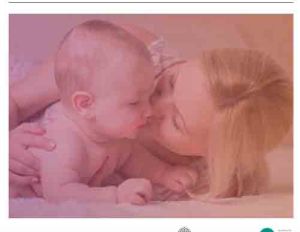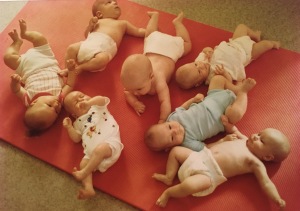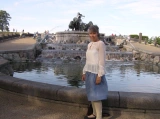Ideas on Safe Motherhood
#two in a series on “Safe Motherhood Week”.

Logo from the “safe motherhood week” and cover photo from a survey on health for mothers in 7 European countries
The assignment I got was to contribute to this EU campaign on this vital task by Irish writer and editor Danielle Barron. The campaign runs every first week of October to create awareness for healthy pregnancies and safe motherhood.
Some collected experience through my profession as a health visitor
I would like to focus on preventing loneliness and postpartum depression.
In Denmark Health Visitors organised from the municipality visit families with newborn babies and follow-up on both mothers’ and babies’ well-being the first years of their lives. We are educated as nurses and take another education on health and children’s development before we can use the “Health Visitor” title. See more here a postcard from Denmark
The last years of my job we became more aware of finding mothers suffering from Post Partum Depression. When the baby was eight weeks old, we let the mother take a test to see those who maybe had this tendency. It was not difficult to talk about the test early in the visits to prepare both parents for this. About one in ten mothers get this depression in some form.
I would offer much more visits than we usually give just to check up on the mother. Sometimes that would be enough to help her. Mothers with grave and persisting anxiety would need more professional help, and I would refer her to her medical doctor.
I would involve her husband to be more engaged in the child’s emotional development and help the family to ask for practical assistance from their family or friends.
Fathers can also get this postpartum depression. The symptoms vary from the women’s.
I wrote about it a post in Danish. It can be google translated should anybody be interested.
When asked about what is a good parent both claim:
To be a good parent is to meet the needs of the child and to be attentive to them
While getting treatment for the postpartum depression, it is essential to understand how to attachment to the baby. Otherwise, both parts will suffer the rest of their lives.
Here my interview with a young woman whose mother suffered from this condition.
In Denmark, we have many months of maternity leave, and fathers have some weeks too, and the parents can share a certain amount of weeks also if they wish. It’s very privileged and suitable for most parents. For some, it can be a time of loneliness.
Taken from the post “A Postcard from Denmark”:
Most are allowed to stop working four weeks before the birth and many can stop eight weeks before. It depends on the agreement at that workplace. The leave is paid.
After the birth, the mother has 14 weeks of leave and the father has two weeks in the same period. After the 14 weeks, they have 32 weeks where they can choose who is going to have the leave the father or the mother. You get paid, but the tariff is different from a workplace to workplace.
From the late 1980’s I engaged in helping mothers to enter into so-called “Mothers’ Groups”. We as Health Visitors would gather those who had new-born babies at a particular month and at a specific district and introduce them to each other mostly in their homes.
Some became friends for many years, and their children have grown up together. It’s a lovely task when the families are similar in social status but can be difficult when they are too different.
The groups are also used today, and the Health Visitors are still present at the first meeting. But ever so often mothers find each other via Facebook and meet for socialising whereas professional groups are formed more to teach on how to treat and understand babies and to prevent them being handled too hard.

From one of my first “mothers’ groups” Copenhagen 1990
Mothers don’t have the energy to visit someone with lots of problems or someone who is living in a dirty and untidy home and maybe the parents were smoking indoors. The other mothers don’t want to mention anything about it so they just come once and the group dissolves. I found it very difficult when these situations popped up as I heard about the problems from both sides.
Often we had special groups or therapy to families with social problems. In that way, we just offered something else than the average “Mothers’ Groups”. These groups were not always totally optional for the invited families to attend to.
Yesterday I had the big joy of meeting one of “my mothers” at a Half Marathon race. We had both finished, and suddenly we saw each other. She said :
You were my Health Visitor! I remember your smile and your voice!
I remembered her too and her prematurely born twins, what months and year they were born. In the fall of 1999, I had at least five premature babies, and a group was made. The mothers stuck together and I met with them as often as I could and during the time. I made video films of the babies for them to have later.
In a few days, my own story on this subject will appear in the WordPress reader.
Categories: #makemotherhoodgreat, Baby care, Health, MakeMotherhoodCount, Safe Motherhood Week


The NHS Trust I used to work for had a specialist inpatient service for mothers with postpartum depression, which allowed them to keep their babies with them while they were treated. I did a lot of work supporting this service, which had a national reputation for providing something which seems so obvious, but which few provided. We had a couple of family rooms too, for dads and young siblings. Maternity leave here is quite good but not paternity – seeing these families bonding and working through their problems together always made me feel that there was something missing from the way this country treats new parents.
LikeLiked by 1 person
Thank you so much for your comment Clive. I am so glad you have worked with this important issue. If you would you could write a post on your thoughts and tag it #SafeMotherHoodWeek and spread your knowledge. I just updated an old post on my own experience as I found I had already written something on what I was about to write this week https://mariaholm.blog/2015/11/20/mothering-through-darkness/
LikeLiked by 1 person
It’s one of those subjects that even today is still stigmatised. People don’t want to admit that such a wonderful event as having a baby can have a downside. I will post if I get the chance, Maria. A little outside my comfort zone but I’ll see what I can come up with!
LikeLiked by 1 person
I would love to read what you have to say. As you mentioned fathers are so important also on this subject
LikeLiked by 1 person
No promises that I can do it, but I’ll try 😊
LikeLike
Please feel no pressure from me. But I like to be asked to write on a certain subject if it’s something I know about
LikeLiked by 1 person
It’s ok, I don’t feel any pressure, but I know when the writing muse isn’t there and there a couple of other things confusing it at the moment!
LikeLike
I used to belong to a mother’s group and found it quite helpful in those early years. We also babysat each other’s children using a points system so that we could all get a night out.
LikeLike
That’s so interesting for me to hear that the mother’s group also are common in England
LikeLiked by 1 person
It used to be called Meet-a-Mum. No idea if it’s still running, but there were lots of Meet-a-Mum groups in my area of South London in the 1980s.
LikeLike
So interesting. That was the time it started in Denmark too
LikeLiked by 1 person
After a crippling post-partum depression with my second daughter I decided to train as an ante-natal teacher with The National Childbirth Trust in the UK. I taught for several years including the pregnancies and births of my two subsequent daughters (I have four of them). I was fortunate in the area of Britain I lived in – the midwifery support and the Health Visitor support was superb and indeed it was my Health Visitor who helped me most during the break-down of my marriage and the exodus of my husband before I knew I was carrying my fourth daughter. She was absolutely invaluable, a life-line at a very confusing and dark time in my life which could have impacted terribly on my young family. I credit her with saving us, actually. In terms of depression, I think it is very important to stress the difference between post-partum depression and pueperal psychosis. I had the former and interestingly my baby was ALL I wanted. I had no trouble bonding with her at all. If I could have gone and lived in a bubble with her and shut out the world I would have been happy (I thought) … the one that suffered was my elder daughter and it was my Health Visitor who recognised that and took steps to make sure I had excellent care in helping me to rebond with her.
LikeLiked by 1 person
I am so glad to get your input here. You are right that these two conditions are different. I was never diagnosed so I will never know what it really was with me. I might have to write a new post to recall things better to understand it better. Have you a post about what you went through?
LikeLiked by 1 person
I haven’t ever written about it, but you remind me that I should. I will put my mind to it in the coming weeks. Thankyou.
LikeLike
I would love to get the link here in the comments if you would
LikeLiked by 1 person
Certainly, I will let you know when I write it and pop a link into your comments. I am not certain when it might be …. I have exams this week and have three posts that I must write first. But after that, I promise. It is a subject I feel very strongly about and your article resonated so strongly with me.
LikeLike
I am so excited and you just take your time. Every time I write about this on a personal level I make progress in understanding and become more free of the burden of it
LikeLiked by 1 person
Wise words indeed – a promise is a promise and I will write it and actually I am sure it will be quite cathartic for me
LikeLiked by 1 person
“You were my Health Visitor! I remember your smile and your voice!” That’s awesome Maria! What an encouragement. Very informative post. I love learning about Denmark from you!
LikeLike
I am so honored by your kind response Sheila. I write about so many things but I tend going back to these subjects on basics in life
LikeLike
And they’re great posts!!
LikeLiked by 1 person
I know that your wonderfully loving focus has been on healthy moms and infants, Maria, but I want to make sure that you, especially, caught this item on my Mental Health Awareness Calendar this month: October 15 is Pregnancy and Infant Loss Remembrance Day.
They are hoping that everyone around the world will join in on the 15th to light a candle at 7pm (in their own timezones) and keep it burning for an hour — so that there will be a continuous wave of healing light over the entire world for the entire day in support of those who will forever grieve losing their precious infant.
Their website, if anyone is interested is www-october15th-com (replace the dashes with periods and add the usual “http colon //” upfront – no spaces, of course).
xx,
mgh
(Madelyn Griffith-Haynie – ADDandSoMuchMORE dot com)
ADD/EFD Coach Training Field founder; ADD Coaching co-founder
“It takes a village to transform a world!
LikeLiked by 1 person
Thank you Madelyn I will for sure take a look at that❤️
LikeLiked by 1 person
Parenting struggles are endless and while looking for the answers to my questions, I came across an app: MyBabyQs. The app is amazing since it connects parents with geofencing technology, and let parents or parents to-be interact with each other.
MyBabyQs truly helped me solve my question from one of the parent who was just 10 miles away. We are friends now.
Thanks to MyBabyQs.
Download:
Android: https://play.google.com/store/apps/details?id=com.my.MyBabyQs
iOS: https://itunes.apple.com/us/app/mybabyqs/id1319758582
LikeLike